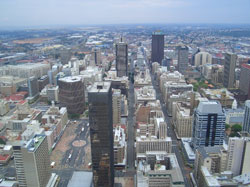Heads of State and business and development experts from across the world are gathered at the three-day African Economic Conference in Johannesburg to discuss regional integration and its role in boosting economic growth and human well-being on the continent.

(Image: Zakysant, via Wikimedia Commons)
The conference will be opened by President Jacob Zuma, Donald Kaberuka, President of the African Development Bank (AfDB) and Abdalla Hamdok, the Deputy Executive Secretary of the United Nations Economic Commission for Africa (ECA).
Africa has seen high levels of economic growth over the last decade, however, that growth has had limited impact on boosting competitiveness and increasing the quality of life of ordinary people on the continent.
Weaknesses persist in the quality of institutions, infrastructure, macroeconomic policies, education and adoption of new technologies, while there are big gaps between its highest and lowest ranked economies.
"This great gathering should do more than restate the case for regional integration: it must examine how to push the African continent to the next level, to become a global growth pole in its own right," said Kaberuka.
"At a time of diminishing multilateral solutions, this is the sure way to build resilience against external shocks. I applaud the steady progress that has been made in areas such as tariff reduction.
"Robust action is what is now needed on non-tariff barriers, trade facilitation, and the movement of people. Africa has the political will and the strategic vision to make this happen. The time is right."
How Africa can get ahead
In addition, because of its focus on capital-intensive, commodity-based industries, Africa has seen limited economic transformation, with little investment in the manufacturing, services and agricultural sectors. Due to these limitations, the creation of jobs, markets and institutions required to help young women and men build better futures has lagged behind.
"There needs to be a much broader definition of regional economic integration. True, regional integration must include investments in regional infrastructure, trade and labour mobility.
"But countries would also gain by harmonising regulations and standards, devising common approaches to macroeconomic policy, job creation, and effective management of shared natural resources for sustainable poverty reduction and structural economic transformation," said Abdoulaye Mar Dieye, Director of UNDP Africa.
While the benefits of integration are now well-known and many of the legal frameworks in place, the biggest challenge is how to further that agenda. Among the major hurdles are harmonising standards and regulations, boosting human resource capacities and mobilising leadership and political will.
The African Economic Conference will look at the political economy of regional integration and examine closely some of the practical solutions to advance it. High-level dialogues will cover integration issues ranging from finance to water resource management, fiscal convergence and harmonisation of social policies.
Participants will also be exposed to cutting edge research on all aspects of regional integration based on new analysis from African researchers and institutions.
Participants at the conference will look at some of the trends and best practices unfolding across the continent.
"It is undeniable that regional integration will impel Africa to economic transformation and industrialisation. Capitalising on natural resources, industrialisation can swiftly add value to the continent's exports and, therefore, stimulate job creation," said Hamdok.
Held every year and sponsored by AfDB, ECA and UNDP, the African Economic Conference will also provide a unique forum for in-depth presentations of policy-oriented research by both established academics and emerging talents from the continent.




























